
Food Production Processing and Nutrition
Scope & Guideline
Connecting food production and nutrition for global impact.
Introduction
Aims and Scopes
- Food Processing Techniques:
Exploration of various food processing methods, including thermal and non-thermal techniques, and their effects on food quality, safety, and nutritional content. - Nutritional Biochemistry:
Investigating the chemical composition of food products and their nutritional implications, including the bioavailability of nutrients and the health benefits of functional foods. - Functional Foods and Bioactive Compounds:
Research into the identification, extraction, and utilization of bioactive compounds in foods, including their health benefits and roles in disease prevention. - Food Safety and Quality Assurance:
Studies on food contaminants, additives, and safety protocols in food production, ensuring consumer protection and regulatory compliance. - Sustainability and Waste Utilization:
Focus on sustainable practices in food production and processing, including the valorization of food waste and by-products for new applications. - Probiotics and Fermented Foods:
Research on the health benefits and functional properties of probiotics and fermented foods, including their impact on gut health and nutrition. - Innovative Food Products:
Development and characterization of novel food products utilizing alternative ingredients and processing methods to enhance nutritional profiles.
Trending and Emerging
- Functional and Nutraceutical Foods:
A rising trend in exploring foods with health benefits beyond basic nutrition, including functional ingredients that can improve health outcomes and prevent diseases. - Plant-Based Nutrition and Alternatives:
Increased focus on plant-based foods, including their nutritional profiles, health benefits, and processing methods, reflecting a shift towards sustainable and health-conscious eating. - Food Safety and Health Risk Assessment:
Growing attention on food safety issues, contaminants, and health risks associated with food production and consumption, driven by consumer awareness and regulatory demands. - Microbiome and Gut Health:
Research on the relationship between diet, gut microbiota, and overall health is expanding, particularly studies involving probiotics and fermented foods. - Innovative Food Processing Technologies:
Emerging interest in non-thermal processing technologies and methods that enhance food quality and nutritional value while minimizing waste. - Sustainable Food Systems:
A significant trend towards research that integrates sustainability in food production and processing, focusing on reducing environmental impact and promoting circular economy practices.
Declining or Waning
- Traditional Food Processing Techniques:
There has been a noticeable decline in research focused on conventional food processing methods as newer, more innovative techniques gain popularity. - Basic Nutritional Studies:
Research that solely focuses on basic nutritional analysis without exploring functional or bioactive components is becoming less frequent, as there is a growing interest in the health benefits of food. - Non-Functional Snacks and Processed Foods:
There is a reduced emphasis on studies related to non-functional processed snacks, as the trend shifts towards healthier, functional food options that provide additional health benefits. - Animal-Based Food Products:
Research focusing on traditional animal-based food products is decreasing, reflecting a growing interest in plant-based alternatives and their nutritional implications.
Similar Journals

Journal of Food Science and Technology-Ukraine
Empowering Food Scientists with Accessible KnowledgeJournal of Food Science and Technology-Ukraine, published by the Odesa National University of Technology, stands as a pivotal platform dedicated to the dissemination of high-quality research in the field of food science and technology. With its open access policy established in 2014, the journal fosters global knowledge sharing and accessibility, enabling researchers, professionals, and students to access critical findings and advancements in food technology without barriers. The journal's commitment to publishing innovative studies, reviews, and case analyses reinforces its role in addressing contemporary challenges in food safety, preservation, processing, and nutritional quality. With ISSN 2073-8684 and E-ISSN 2409-7004, it serves as a valuable resource for the academic community, supporting the advancement of food science knowledge and its practical applications.
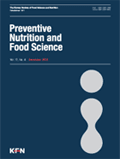
Preventive Nutrition and Food Science
Empowering Evidence-Based Nutrition for Optimal WellbeingPreventive Nutrition and Food Science, an esteemed journal published by the Korean Society of Food Science and Nutrition, serves as a pivotal platform for the dissemination of innovative research and insights in the fields of food science, nutrition, and dietetics. With an ISSN of 2287-1098 and an E-ISSN of 2287-8602, this journal is dedicated to advancing knowledge from 2012 through 2024, showcasing contributions that reflect the interplay between nutrition, health, and preventive strategies. Indexed in Scopus, it proudly holds a Q2 ranking in Food Science and a Q3 ranking in Nutrition and Dietetics as of 2023, positioning it among influential publications within these disciplines. Researchers, professionals, and students can explore cutting-edge studies that contribute significantly to evidence-based practices, enhancing public health and nutritional care. Although it operates under a subscription model, the journal plays a crucial role in fostering a deeper understanding of preventive nutrition, advocating for advancements that address contemporary dietary challenges.

Nutrients
Leading the way in dietary research and innovation.Nutrients is a premier, peer-reviewed open access journal published by MDPI, dedicated to advancing the field of nutrition and dietary research. Since its inception in 2009, this journal has consistently garnered acclaim, achieving a Q1 ranking in both Food Science and Nutrition and Dietetics, reflecting its significant impact in these vital areas of study. With a robust Scopus ranking of #40 out of 389 in Food Science and #18 out of 140 in Nutrition and Dietetics, Nutrients has established itself as a leading platform for researchers, practitioners, and students aiming to share and gain insights into nutritional epidemiology, dietary interventions, and policy implications. Hailing from Basel, Switzerland, the journal ensures broader accessibility through its open access model, inviting diverse contributions that enhance our understanding of nutrition in health and disease. By fostering collaboration across disciplines, Nutrients not only serves as a resource for high-quality research but also encourages innovation essential for tackling global nutritional challenges.

FOOD SCIENCE AND BIOTECHNOLOGY
Exploring the Intersection of Science and Culinary ArtsFOOD SCIENCE AND BIOTECHNOLOGY, published by the Korean Society of Food Science & Technology (KOSFOST), stands as a prominent peer-reviewed journal dedicated to advancing knowledge in the fields of food science, biotechnology, and applied microbiology. With ISSN 1226-7708 and E-ISSN 2092-6456, this journal serves as a pivotal platform for disseminating high-impact research from South Korea and beyond, reflecting a robust Q2 ranking in multiple categories including Applied Microbiology and Biotechnology, Biotechnology, and Food Science as of 2023. The journal's influence is further emphasized by its positions in various Scopus ranks, where it showcases a commendable percentile ranking in Agricultural and Biological Sciences and Biochemistry. Although access options remain limited, the journal’s objectives revolve around the publication of innovative research, fostering interdisciplinary collaboration, and facilitating the exchange of ideas among a diverse community of researchers, professionals, and students. Whether you are involved in food technology, microbial biotechnology, or nutritional sciences, FOOD SCIENCE AND BIOTECHNOLOGY are instrumental in shaping the future of these critical fields, propelling advancements that enrich our understanding of food systems and health.
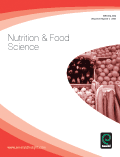
Nutrition & Food Science
Bridging the gap between food technology and health.Nutrition & Food Science, published by EMERALD GROUP PUBLISHING LTD, is a prominent journal dedicated to advancing the understanding of nutritional science and food technology. With an ISSN of 0034-6659 and an E-ISSN of 1758-6917, this journal has provided a platform for scholarly articles, reviews, and insightful research since its inception in 1971. The journal is recognized in the Q3 quartile for both Food Science and Nutrition and Dietetics categories, showcasing its moderate impact within the field. Currently ranked #202 in Food Science and #81 in Nutrition and Dietetics based on Scopus metrics, it caters to a diverse audience of researchers, practitioners, and students eager to explore the latest findings and developments. While not an open-access journal, it offers various subscription options for individuals and institutions keen on accessing high-quality research. With a commitment to interdisciplinary collaboration and practical applications, Nutrition & Food Science is an essential resource for those invested in improving health outcomes through informed dietary practices and food innovations.
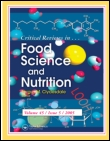
CRITICAL REVIEWS IN FOOD SCIENCE AND NUTRITION
Elevating Standards in Nutrition and Food ScienceCRITICAL REVIEWS IN FOOD SCIENCE AND NUTRITION, published by Taylor & Francis Inc, is a premier peer-reviewed journal dedicated to advancing the understanding of food science and nutrition. With its ISSN 1040-8398 and E-ISSN 1549-7852, this influential journal has established itself as an essential resource in the field, featuring high-quality reviews and critical analyses that foster innovation and knowledge sharing among researchers, practitioners, and academics. Recognized as a Q1 journal in Food Science, Industrial and Manufacturing Engineering, and Medicine (miscellaneous) for 2023, it ranks impressively within the top percentiles of its respective fields, making it a valuable platform for impactful research. Although the journal does not currently offer open access, it continues to attract a readership eager to explore the intricacies of food science and its applications, thereby shaping future advancements in the industry. With an extensive history dating back to 1981 and convergence up to 2024, CRITICAL REVIEWS IN FOOD SCIENCE AND NUTRITION remains committed to providing comprehensive reviews that illuminate contemporary challenges and solutions in the domain of food science and nutrition.
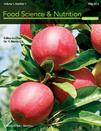
Food Science & Nutrition
Championing open access to vital food and nutrition research.Food Science & Nutrition is an esteemed peer-reviewed journal published by WILEY, dedicated to advancing the fields of food science and nutritional research. With an impressive impact factor and a prestigious Q1 ranking in the Food Science category, this journal stands out as a leading platform for innovative research, offering meaningful insights into the relationship between food composition and health outcomes. Since its transition to Open Access in 2013, Food Science & Nutrition has championed the global dissemination of knowledge, ensuring that vital research is accessible to researchers, professionals, and students alike. With a vast scope that encompasses both agricultural and biological sciences, the journal provides a comprehensive view of emerging trends, methodologies, and applications in food security and nutrition, making it indispensable for those invested in these critical areas.

International Food Research Journal
Transforming Ideas into Impactful Food ResearchThe International Food Research Journal, published by UNIV PUTRA MALAYSIA PRESS, serves as a pivotal platform for disseminating innovative research within the field of food science. With an ISSN of 1985-4668 and an E-ISSN of 2231-7546, the journal has successfully established its presence since its inception in 2007, converging its findings through 2024. This esteemed journal holds a Q3 ranking in Food Science, illustrating its valuable contributions to the field as demonstrated by its Scopus rank of 276 out of 389, placing it in the 29th percentile among its peers in Agricultural and Biological Sciences. Although it operates under a traditional publishing model, its academic integrity and focus on high-quality research ensure that it remains a vital resource for researchers, professionals, and students eager to explore advances in food technology, nutrition, and safety. By encouraging interdisciplinary collaboration and critical dialogue, the International Food Research Journal plays an essential role in shaping the future of food science research.
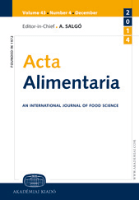
ACTA ALIMENTARIA
Elevating knowledge in food microbiology and safety.ACTA ALIMENTARIA is a renowned journal in the field of food science, published by AKADEMIAI KIADO ZRT, based in Hungary. Since its inception in 1973, it has served as a vital platform for disseminating high-quality research on food chemistry, microbiology, nutrition, and technology, contributing significantly to the advancement of knowledge in the agricultural and biological sciences. Currently classified in the Q3 quartile of the 2023 Food Science category, the journal is positioned to address pressing issues pertaining to food safety, quality, and sustainability, making it an invaluable resource for researchers, professionals, and students alike. Although it does not currently offer open access, the journal maintains a strong reputation with a readership keenly interested in the latest developments in food science. With a Scopus rank placing it in the 38th percentile of its category, ACTA ALIMENTARIA continues to be a pivotal reference for those engaged in food research and innovation.

Acta Scientiarum Polonorum-Technologia Alimentaria
Showcasing Excellence in Food Technology InnovationsActa Scientiarum Polonorum-Technologia Alimentaria, published by Poznan University of Life Sciences, is a revered journal in the field of food science, showcasing cutting-edge research and innovations in food technology. Established as a leading platform within its domain, this journal is indexed under Scopus and ranks in the 2023 Q3 quartile for Food Science, demonstrating its commitment to high-quality scholarship. With an ISSN of 1644-0730 and E-ISSN 1898-9594, it serves as a critical resource for researchers, professionals, and students seeking to stay at the forefront of advancements in food safety, quality control, and sustainable practices. The journal has also been recognized for its contributions to the agricultural and biological sciences, positioning itself at rank #205 out of 389 in this competitive field. While currently not offering open access, the journal's valuable insights and findings, especially as it publishes through 2024, play a crucial role in advancing knowledge and fostering collaboration among experts in the food science sector.